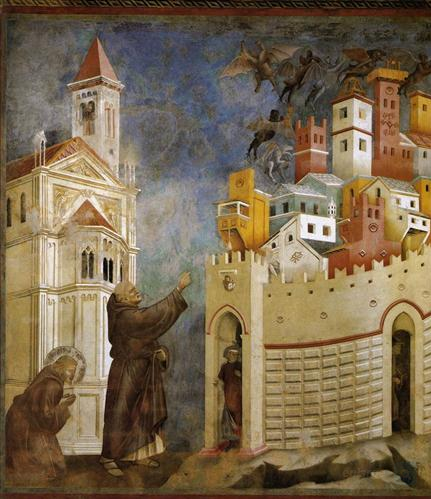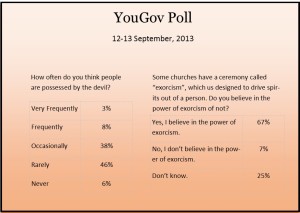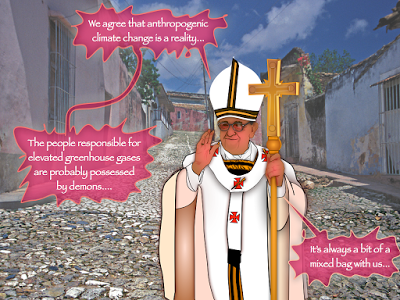I’ve been unable to post to my website for almost two weeks, but thanks to the heroic efforts of BuildBusiness (who host my website) over several days, I’m back up and running.
A couple of days ago, Jerry Coyne kindly posted something I’d written but was unable to post on his website, Why Evolution is True. Many of you will have already read it there, but for those that haven’t, here it is.

The Exorcism of Arezzo by Giotto. St Francis of Assisi kneels in prayer and support of Friar Sylvester, whom he called on to drive out the demons Francis had seen over the city. (Source: WikiArt)
Just when you thought the Roman Catholic Church might be heading towards rationalism with its encyclical on Climate Change, reality bites. It seems that the Church is so concerned with the state of morality in Mexico that an exorcismo magno (“great exorcism”) was carried out there on 20 May. This is apparently only the second time this rite has ever been performed; the first time was by Friar Sylvester at the urging of St Francis of Assisi in Arezzo, Italy in 1224.
In the modern church, the rite of exorcism had become a bit of an embarrassment – an eccentric uncle no one talked about. Some even refused to admit it existed. Belief in hell and the devil himself had been declining, especially in the West. In 1997, a New York Times article reported on a Barna Research Group survey of American beliefs. Although back then 95% of the population still believed in God, and most also believed in heaven and angels, only 30% thought the Devil actually existed. Further, only 31% thought hell existed as “a place of physical torment.”
That’s changing.
By December 2013, Pope Francis had been in office for nine months, and perhaps that was long enough for the gestation of some new ideas in the religious consciousness. A Harris poll reported that while U.S. belief in God had dropped to 74%, their belief in the Devil and Hell had both increased to 58%.
When Jorge Mario Bergoglio became Pope, he chose the name Francis after St Francis of Assisi. His explanation of that was that the Church needed to focus more on the poor and on its own spiritual nature. But it soon became evident that “spiritual” included the bad aspects of the word, and it wasn’t only St Francis’s work with the poor that the new pope wished to emulate. The “Pope Francis Effect” has become well known since his election in 2013. His frequent references to the Devil and the temptations of evil in his sermons have made exorcism once again a mainstream phenomenon.
In June last year, Pope Francis formally recognized the statutes of the International Association of Exorcists (AIE). They of course were thrilled by this acknowledgment; L’Osservatore reported the head of the organization, Rev Francesco Bamonte, considered “… the Vatican approval was cause for joy.” The AIE has around 300 members worldwide and was founded in 1990, but had never received formal Vatican recognition. They are the elite of the world’s exorcists, meeting every two years in Rome to discuss trends and techniques in their professions.
Coincidentally (yes, I’m being facetious), since the pope’s endorsement of the AIE’s work there has been an increase in demand for their services. The Telegraph’s Nick Squires interviewed several attendees of their week-long conference in Rome two months ago. The reporting is revealing and scary, although not for the reasons the exorcists believe. Father Cesare Truqui, Chief Exorcist of Chur, Switzerland, says that these days about a third of the phone calls received by Catholic officials in Rome relate to exorcism. Truqui also noted that exorcists are able to tell the difference between possession and mental illness. As he also claims to have taken part in around a hundred exorcisms, that’s clearly not true.
On the first day, the 150 attendees of the conference were addressed by Monsignor Luigi Neri, the archbishop of Ferrara. According to Squires, Neri ascribed the increasing need for exorcisms to atheism and consumerism. Throughout the week, other causes were examined as well. These included pornography, television, drug-taking, greater interest in the occult, and Satanism. Previously, Harry Potter and yoga have also been cited as risk factors for possession.
A 2013 YouGov poll demonstrates the widespread belief in the devil, possession and exorcism amongst Catholics. It shows that 94% of them believe that people are sometimes possessed by the Devil, with 67% believing in the power of exorcism (another 25% are unsure).
Dr Valter Cascioli, spokesperson for AIE, warned on Vatican Radio in November, 2014 of “an extraordinary increase in demonic activity.” Dr Vascioli is a psychiatrist; this is another example of the incredible potential for damage faith has when it replaces proper medical care. As Jerry Coyne said about exorcism in Faith vs Fact (page 238):
“… who knows how many disturbed people have been subjected to a frightening procedure that is harmless at best, but potentially dangerous, especially when those who use it misconstrue and thus ignore the real causes of mental illness?”
Dr Vascioli doesn’t even have the excuse of not knowing the real cause of mental illness; he simply ignores them in favour of faith.
As a result of the increased demand from believers for spiritual healing, the training and appointment of exorcists has become widespread. According to other reporting from Nick Squires, three years ago only about half of English and Welsh dioceses had an official exorcist; now almost all of them do. He has also seen similar increases in the number of exorcists throughout the world. For example, the archbishop of Madrid sent eight priests for training due to “an unprecedented rise” in instances of “demonic possession”.
And so we come to Mexico, which according to the Pew Research Center (2014) has a populace that is 81% Catholic. The Church decided it was time to do something about the problems of Mexico, which according to them are drug cartels, high levels of violence, and abortion. So what did they come up with? Education? Programs to help the poor? Community outreach? Job creation? Community health centres? No. What they decided on was prayer. But not just any prayer. For the first time in almost 800 years they were going to perform an exorcismo magno, and they were going all out! It wasn’t just a town this time, but a whole country!
Under the leadership of Cardinal Juan Sandoval Íñiguez, the archbishop emeritus of Guadalajara, a group of exorcists got together behind closed doors in the cathedral of San Luis Potosí, strategically located in the centre of Mexico for the best dissemination of anti-demonic forces. The event wasn’t announced beforehand because, according to the Catholic News Agency (CNA), they wanted “… to avoid any misguided interpretations of the ritual.” I’m not sure what they imagine “misguided interpretations” would entail. My only interpretation, which I don’t consider misguided, is that it was a colossal waste of time, and by not announcing it there wasn’t even hope for a placebo effect.
“If” it doesn’t work, though, those taking part have already provided several explanations. Spanish demonologist and exorcist Father José Antonio Fortea, who attended the ceremony, spoke to CNA:
The Spanish exorcist explained, however, that the celebration of this ritual will not automatically change the difficult situation Mexico is going through in a single day.
“It would be a big mistake to think that by performing a full scale exorcism of the country everything would automatically change right away.”
Nevertheless, he emphasized that “if with the power we’ve received from Christ we expel the demons from a country, this will certainly have positive repercussions, because we’ll make a great number of the tempters flee, even if this exorcism is partial.”
“We don’t drive out all the evil spirits from a country with just one ceremony. But even though all will not be expelled, those that were removed are not there anymore.”
Fr. Fortea emphasized that “when the exorcists of a country drive out its demons, it has to be done in faith. You’re not going to see anything, feel anything, there’s not going to be any extraordinary phenomenon. We have to have faith that God conferred on the apostles a power, and that we can use this power.”
I bet Beelzebub is shaking in his boots.
Professor Ceiling Cat (aka Professor Jerry Coyne) added this “gratuitous photo” on his website:
Also, I’m honoured to post this cartoon from someone whose work I greatly admire, which I’m told was inspired by this article. You can find more of their work can at the Evolving Perspectives website.




Hi Heather. Glad you’re back. Good post. Why didn’t we hear about this from msm?
It seems to me that religion is a giant placebo. Sometimes it helps just because people think it helps. It is not unreasonable to think of people addicted to drugs, gambling, porn etc as being possessed by demons. We know that these are not external entities, but afflictions of the psyche. But we can see exorcism as a form of therapy to give the afflicted some control over these inner demons.
As for Pope Francis, I think we rationalists must take what we can get from him. It’s too much to think that he’s going to throw over 2000 years of bad traditions. But his speaking out against exploitative capitalism, his softening somewhat on gay issues, and his acceptance of the scientific consensus on anthropogenic climate change, are all good things, and put religious obstructionists in a difficult position. I just hope he lives long and keeps growing.
That’s my feeling too. People are criticizing his climate change encyclical because he doesn’t tackle over-population, but what do they expect really. It’s better than the Southern Baptists etc who deny anthropogenic climate change is even real. I say we take what we can get. I’m perfectly happy to praise the good stuff and criticize the bad stuff. As you say, 2,000 years of bad traditions aren’t going to dissolve overnight.
I’m a bit more leery than you about the potential benefits of exorcism. We’ve had a couple of cases of people dying during exorcisms in NZ (they were fundamentalist Protestants, not Catholics, so didn’t get a mention), so as well as not helping, I worry about how dangerous they can be.
Hi Heather. Did you get my comment? It doesn’t seem to have posted to your page.
Hi Paxton, your comments got caught up in moderation for some reason – not sure why. Anyway, I’ve approved them all, and hopefully you should be OK now.
Let me know if you want me to delete any of your comments. (I’m happy to leave them all up.)
Ok that one posted so I’ll try again
Good essay. Why didn’t we hear of this from msm?
I think we can regard religion as a giant placebo. Sometimes it helps people to believe something is true, even if it isn’t. It seems reasonable to regard addictions to drugs, gambling, porn, etc, even hatred, as being possessed by demons. We know these are not independent external entities, but afflictions of ones own psyche. But we can see exorcism as a kind of therapy, that may in some cases help the afflicted get some control over the affliction.
As for Pope Francis, I think we must accept what he can offer. It is too much to expect that he will overturn 2000 years of harmful beliefs and practices. But his softening on the gay issue, his denunciation of exploitative capitalism, and his acceptance of the scientific consensus on anthropogenic climate change, are enormous steps in the right direction. It was very disappointing that he rejected population control as a method to mitigate environmental destruction, but again, we can’t expect everything at once. I just hope he lives long and keeps growing.
Third try. Nice essay Heather. Interesting that the msm tells us nothing about this.
I think religion can be regarded as a universal placebo. Sometimes it feels better to think that something is helping, even if it isn’t. It’s not unreasonable to regard addictions to drugs, gambling, porn, etc, even hatred, as demons. We know these demons are not independent external entities, but malfunctions in the addict’s brain. Exorcism can be regarded as a form of therapy to try to restore some self control to the addict. Like any therapy, it should be judged by the results.
As for Pope Francis, I think we have to take what he can give. It’s out of the question that he’s going to undo 2000 years of wrong beliefs and mandates in a single lifetime. Yes, it’s very disappointing that he rejects population control as essential to environmental protection. But it is helpful that he has accepted the scientific consensus on anthropogenic climate change, and softened his position on gays. His denunciation of exploitative capitalism is especially encouraging. I know other popes have done that before, but it is more compelling coming from this pope, who seems more open to change than his immediate predecessors. I can’t agree with those who reject half a loaf because it’s not the whole thing. I hope the pope lives long and keeps growing. (As you know I am not a catholic, nor a Christian.)